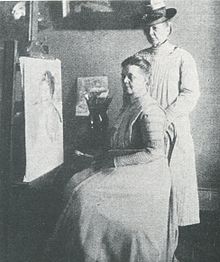Helene Cramer
| Helene Cramer | |
|---|---|

Molly Cramer (in front) with her sister Helene in 1900
|
|
| Born |
13 December 1844 Hamburg, Germany |
| Died | 14 April 1916 (aged 71) Hamburg, Germany |
| Nationality | German |
| Education | Traditional Dutch school |
| Known for | Still life paintings of flowers and fruits, landscapes, portraits |
| Movement | Impressionism |
| Patron(s) | Alfred Lichtwark |
Helene Cramer (13 December 1844 – 14 April 1916) was a German flower, landscape and portrait painter.
Helene Cramer came from a wealthy merchant family from Hamburg-Uhlenhorst. Like her sister, the painter Molly Cramer, she also began her training as a painter in 1882 after the death of her father Cesar Cramer. At the beginning of the studies already 38 years old, their first teachers were the Hamburg illustrator Theobald Riefesell as well as the painters Carl Rodeck and Carl Oesterley. At the end of the 1880s she went to The Hague to train under Margaretha Roosenboom and together with her sister at the Belgian Still Life painter Eugène Joors in Antwerp. Joors taught them particularly in the art of still life.
Returned to Hamburg, she mainly made flower still life (flower pieces). Her works were regularly exhibited at major German exhibitions, such as the Glass Palace Munich and the Great Berlin Art Exhibitions (Große Berliner Kunstausstellung). In Berlin she exhibited several times between 1893 and 1908, always together with her sister Molly. She also exhibited in 1893 at the Chicago World's Fair and Exposition with her paintings Clematis and Roses and in 1900 at the Woman's Exhibition, Earl's Court, London, S.W. with: Fir Forest; Trapäolum; Narzissen; Morgensonne im Wald; Gloxinien and Fuchsien.
The director of the Kunsthalle Hamburg Alfred Lichtwark acquired 1896 some of their pictures for the Collection of pictures from Hamburg. Lichtwark, who often frequented the sisters house at Uhlenhorst, also established contact with members of the Hamburg Artists' Club of 1897 (Hamburgischer Künstlerklub), among others with Ernst Eitner, Arthur Illies and Paul Kayser. Through visits by the artists in their house, this became an artistic achievement at the beginning of the 20th century. Without joining the club, the sisters later exhibited their paintings together with them.
...
Wikipedia
